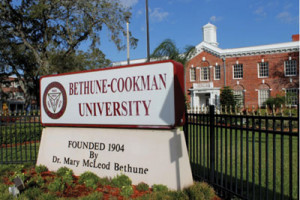
A controversial dormitory project which has landed Bethune-Cookman University (B-CU) in the crosshairs of angry alumni in and around Daytona Beach will apparently cost the university more than $300 million over a 40-year payment agreement and was executed with the forged signature of school President Edison Jackson.
The residence hall, which some graduates criticized for its $72 million publicized sticker price, actually cost more than $85 million to build and will eventually amount to $306 million with financing requirements, according to the Daytona Beach News-Journal.
Among the more startling elements of the report:
The deal is structured so that B-CU’s monthly payments on the dorm will increase by 1.5 percent annually over the life of the lease from a low of $470,000 a month to a high of about $840,000 — or about $10 million a year. Financial documents also suggest that the school is already struggling to make these payments and has been deferring some.
- B-CU, meanwhile, is scrambling to find money to keep its operations going. Last year, the school’s operating cash flow was a negative $7.8 million. And just last month, Jackson thanked the board for approving a drawdown of $10 million from earnings on its endowment, a restricted investment account.
The story also outlines de-tails of the school’s lease and sublease agreement with TG Quantum, which was selected over proven vendors without a history prior work, and was cleared to buy land from B-CU for the purpose of leasing it back to students at more than $450,000 in monthly rent. The costs were to be covered by student housing fees, which were approved for a three percent increase last fall, and by an approved three percent tuition increase set for the 2018-19 academic year.
University officials confirmed the numbers but also suggested that the school is on sound financial footing despite a credit downgrade and the $10 million drawdown on its endowment.
“Under President Edison O. Jackson’s leadership, the university has materially improved operating results in 2017,” B-CU Chief Operating Officer Albert Mosely said, pointing to the most recent Fitch ratings report that downgraded its credit rating but also said the school had a stable outlook going forward. “We expect to maintain and slowly grow our financial resources over time.”